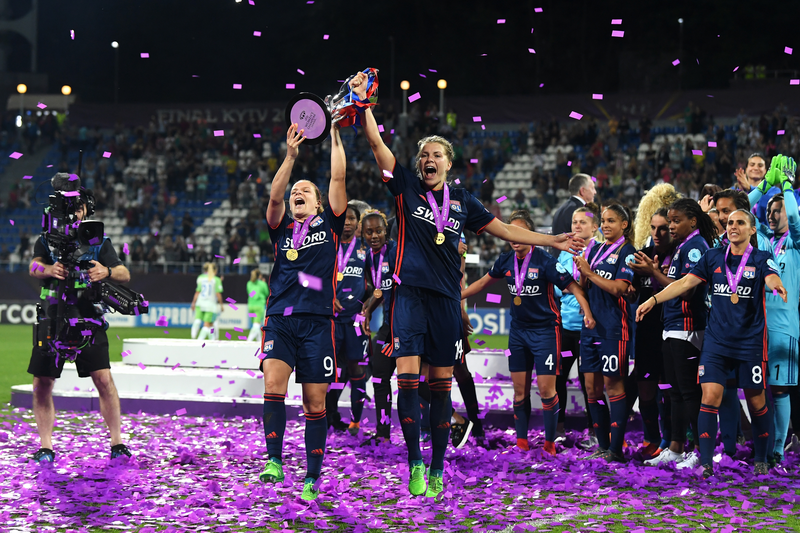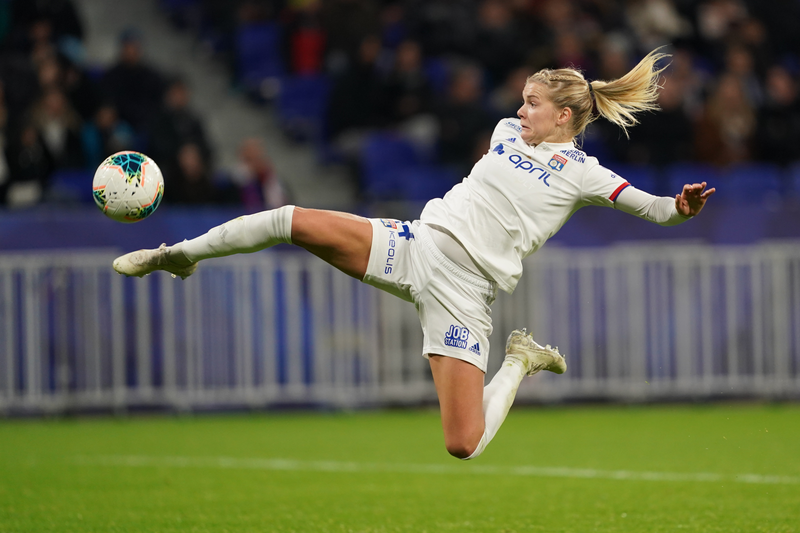Ada Hegerberg insists she wants to return from injury an even better player
She urges women’s club football to build on the interest generated by France 2019
The striker talks life at Lyon and wanting to emulate Megan Rapinoe and Marta
"Football is what I like the most. It's up to me to work as hard as I can to hopefully make a living from it and play for a very long time at the highest level."
The words, which Ada Hegerberg told FIFA.com during the FIFA U-20 Women's World Cup Japan 2012™ - when she was the youngest member of Norway's squad - showed that, even then, she knew precisely where she wanted to go and how she was going to get there.
Eight years later and a now an elite professional, she has already achieved her first objective. Moreover, she is currently one of the best players in the women’s game. Unsurprisingly, her philosophy has not changed one iota. The Lyon striker continues to demonstrate formidable determination and an enviable work ethic to remain at the highest level season after season.
It is this mentality that is enabling Hegerberg to overcome the first major setback of her career, a cruciate ligament injury to her right knee suffered last January. Combined with forced isolation due to the COVID-19 pandemic, the situation would discourage most people. The 24-year-old, however, is using it as an additional source of motivation.
"My ambition is to come back even stronger," she told FIFA.com in an interview, in which she also spoke about the vital efforts required of each player to develop women's football.
FIFA.com: Ada, where are you now in terms of your recovery? Did the suspension of competitive football cause you to tweak your programme and allow more time for your recovery?
Ada Hegerberg: Everything’s going very well at the moment. We’re sticking to the schedule and the knee is doing very well. I turned a corner after the first two and a half months as I was told that would be the most complicated period, so I’m very confident now. But the situation hasn’t changed anything and my recovery programme remains the same. My philosophy is to take however long I need to recover so that when I come back, I do so at 100 per cent of my ability. You have to work to get back to playing, but also to come back even stronger, which is my ambition. It's a mental and physical challenge and one that’s making me grow.
Has this obligatory pause allowed you to take some time for yourself, to take a step back and consider what you’ve already accomplished?
With the current situation, we’re all a little impeded in our lives – we’ve put aside some of our freedoms for the good of society as whole. This gives us time to think differently. With everything I've been through with my family, friends and everyone around me, I consider myself to be very privileged in life. Mental health is extremely important in this scenario. With the injury, but also with COVID, I took a step back from football. I took the time to reflect on what I've been through in the last few years, but also on what I want to do in the future. This situation is a big challenge for me, but at the same time, it’s allowing me to enter a new phase in my career to go on and achieve everything I still want to do.
Your injury and rehab, generally a time when support is needed most, coincided with the introduction of quarantine measures. How did you deal with the confinement?
The hardest part was being separated from my team, not being able to experience the atmosphere of the dressing room and our shared ambitions. That's football: one minute you’re sharing the same goals as everyone on the team and working hard collectively to achieve them, then suddenly you find yourself kind of on the periphery. It's been a challenge, but when you engross yourself more and more into work and rehabilitation, it gets better. That said, I can't wait to get back to the girls and the team.

Are you someone who prefers short-term goals or a long-term plan?
I always stay focused on preparation. If you know you're well prepared, the results will come naturally – that’s always been my philosophy. You need to have short-term goals, for example, to improve game on game by assessing your performance after each match, but also have big dreams and a goal that you work every day to attain. But we mustn’t forget to stay in the present. I’ve learned a lot by staying focused on the here and now, and enjoying the present moment, rather than rushing towards what’s coming next. You need to strike a balance between short- and long-term aspirations, and I need both in order to work well and succeed.
Do you think you can still improve, or is your goal now simply to stay at this level as long as possible?
The biggest motivation of my career is to reach my maximum potential. And I haven't done that yet! If I can do that, then I’ll be happy the day I retire. That's what motivates me every day. I hope to stay at the highest level as long as possible and make the most of it, because it goes very quickly. That's what I've always heard from older team-mates: that one’s career goes by so fast that you have to do all you can to reach your full potential. The goal now is to reach the next stage. I don't think I'll be the same player when I come back, because I'm going through a different period, mentally and physically. I’m looking forward to it with a lot of enthusiasm and motivation.
The question also applies to Lyon: can the team do even better when they’re already winning everything year in, year out? Is it frustrating to think that you can't go any higher?
But it's an even bigger accomplishment when you do it a second, third or fourth time. That's the hardest part of the game: staying at the very top and doing it all over again. The greatest sportspeople are the ones that stayed at the top the longest. As a team, that's what we’ve managed to do. It's magnificent, though always harder to win over and over again. It's an even bigger challenge. You have to enjoy the work, be smart and analyse each season to see what you've done well, what you can do better, what you need to develop and what you need to change. It takes a lot of character, a lot of work. And can people stop saying that it's boring to see us win all the time? We hear from time to time that something new is needed. At Lyon, we’re able to win everything, year after year, but it requires a lot of work and character, and puts big demands on us.
With women's football continually developing, do you think it needs constant promotion to ensure its popularity doesn’t suddenly wane?
The biggest challenge is to keep that interest for a whole season. There are great club games, great teams, great players, and the standard of the Champions League is really good. The goal is to draw people back every weekend. We see after every big tournament that interest drops when the girls go back to their clubs. That's the next step: we have to maintain that interest. We players all have a responsibility to perform every day, to train more and more so as to create a good level. But we also need the help of clubs, federations, UEFA and FIFA to continue to promote the women's game. We’re not just doing it for ourselves as individuals; we’re doing it for the sport. We love this sport so much and know that there are girls and women who will come after us, just as there were pioneers before us. We have the opportunity to change things so that things move in the right direction.
The stars of the men's game just have to focus on the playing side of things, but in women's football, being a good player is not enough. Top players are also required to be ambassadors for the sport and fight for it off the pitch...
If women can speak up, then all the better. They do it out of responsibility for their sport, as it needs women who can make a difference. When these players put themselves forward, they then have an obligation to perform, and that’s perhaps the most important thing. If you don't perform, then your words don't carry the same weight. Performance must always come first. After that, we're in a position to be able to say something. And if you have that opportunity to express yourself through good performances, it would be a waste not to do it. You're not just playing for yourself – we're playing for a world in which all girls would have the same opportunities. I think it's good that more and more players are making their voices heard, because it can really have an impact on the game’s development.

Many charismatic players who are striving to develop women's football are near the end of their careers – people like Megan Rapinoe and Marta. You're still young. Are you ready to take up the torch?
Yes, but firstly and most importantly, I have to make my comeback, play football and be a performer. It must always stem from the game, so first I want to give my all on the pitch. That said, it's almost impossible to be a footballer today without battling off the pitch too. There is so much to be done, and we want things to improve and for the right conditions to be in place. The fact that many of the voices that carry weight are more experienced players at the end of their careers also shows that it is not always easy to be heard. There’s a lot of criticism and judgment both in society and sport. Maybe when you're older, you have more experience, more self-confidence. It’s very important to have prominent figures who lead the way.
Is the standard of the FIFA Women's World Cup France 2019™ a good measure of the effectiveness of these efforts to develop women's football?
That's the impression I had in France. The World Cup opened my eyes – it was a beautiful spectacle. Of course, we saw an American team that taught the European sides a lesson, but on the whole, it was a good tournament and a very good advertisement for women's football. Now, though, it has to continue on a daily basis at the clubs, because there’s a lot of good work going on throughout the season. That's the real challenge: to maintain for the entire year the level of interest generated during a World Cup.
Of all the honours you’ve won, collective or individual, which one made you most proud?
I’ll leave that question until the end of my career, because I still have a lot of goals to achieve. However, winning the Champions League four times are my best memories thus far. On an individual level, I’d like to mention the Ballon d'Or. I’m only just coming to terms with being the first to win it. You don’t process it in the moment, as you just want to keep performing day in, day out. But having taken some time to reflect on everything that has happened to me so far, this trophy, the first Women's Ballon d'Or awarded, was a great moment both for me and our sport.
